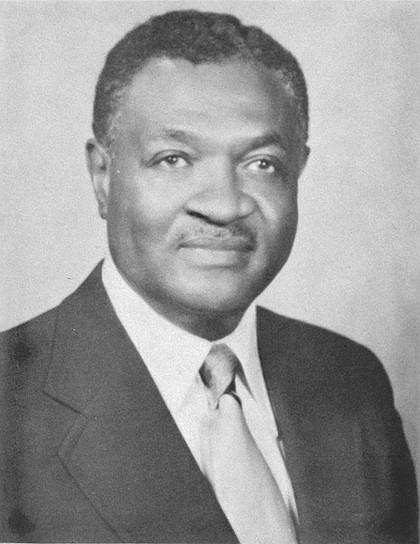A treasure trove of history
Jackson Ward couple discovers legal papers of civil rights icon Roland J. ‘Duke’ Ealey
Jeremy M. Lazarus | 11/16/2023, 6 p.m.
Five years into the renovation of a 143-year-old brick house on East Clay Street in Jackson Ward, James Vigeant’s work halted.
To his surprise and amazement, he found an unexpected treasure — 144 moldy boxes filled with the decaying legal papers of one of Richmond’s legal giants, Roland J. “Duke” Ealey.
Some of the finds that Mr. Vigeant would go on to uncover with the help of neighbor and historical photographer Theodore Holmes included:
• Poll tax litigations and campaign information
• Richmond Crusade For Voters literature and training materials
• Prince Hall Fraternal Order of Black Freemasonry documents
• Massive Resistance and the Byrd Machine
• Interstate Highway System family displacement records
• Brown v. Board of Education paperwork
“It was breathtaking,” Mr. Vigeant said.
When Mr. Vigeant first discovered the Ealey files in January 2019, he knew nothing about Mr. Ealey and thought the boxes were filled with old accounting files. He planned to send them to the city dump. But on closer examination, he realized his error.
“Many of the files that I opened dated back to the 1940s and they were all connected to Mr. Ealey,” he recalled. “I wanted to know who Mr. Ealey was, so I Googled him.”
About Roland J. “Duke” Ealey
Roland J. “Duke” Ealey was born June 20, 1914, in Kershaw, S.C., although his family would soon move to Richmond in 1915, where he graduated from Armstrong High School. He later graduated from Virginia Union University with a bachelor’s degree in 1936, and earned a law degree from Howard University in 1939.
Mr. Ealey also served in the U.S. Army from 1943-1946, according to the Virginia House of Delegates Clerk’s Office.
As an attorney and civil rights lawyer, Mr. Ealey filled numerous roles throughout his life, from legal staffer for the national NAACP to teaching at the Lincoln University School of Law in St. Louis.
Mr. Ealey was part of a coalition of African-American lawyers in Virginia who worked to advance racial equality through their work, often offering their services free of charge.
Alongside Oliver W. Hill Sr. and other notable lawyers of that time, Mr. Ealey participated in several important cases that expanded or defended the rights and humanity of African-Americans, and
helped lessen racial disparities in society.
Mr. Ealey also worked to improve his community, serving as a founder and president of the Old Dominion Bar Association and its Richmond Chapter, and as a member of the Kiwanis Club of Richmond, the Grand Lodge of Virginia and several other groups.
Aside from his legal and community work, Mr. Ealey sought to effect change through politics. Following a failed run for a seat in the Virginia legislature in the 1950s, he was elected to the House of Delegates in 1983 in a special election for the 70th District after Del. James S. Christian Jr. died.
Mr. Ealey would win five subsequent elections for the seat and serve on multiple committees during his time in the House of Delegates. He died on March 23, 1992, in Richmond.
Highlights
1940: Mr. Ealey is admitted to the Virginia State Bar.
1943-1946: Served in U.S. Army.
1949-1950: Mr. Ealey, alongside Martin A. Martin, Oliver W. Hill Sr. and Samuel W. Tucker, serves as defense lawyer in the case of the Martinsville Seven.
1951: Mr. Ealey first runs for a position in the House of Delegates.
1958-1961: Mr. Ealey, working with Oliver W. Hill Sr., argued a case, Johnson v. Virginia, that eventually led to the desegregation of Richmond’s schools.
1962: Mr. Ealey represents Ford T. Johnson Jr. in a U.S. Supreme Court case that leads to the desegregation of courtrooms across the country.
1974: Mr. Ealey and other Black lawyers successfully lobby Gov. Mills E. Goodwin Jr. to select James E. Sheffield to fill a vacant circuit court judge seat in Richmond, with Mr. Sheffield becoming the first African-American to serve in that role in Virginia
1983-1992: Mr. Ealey serves in the House of Delegates, representing the 70th District until his death.
Compiled by George Copeland Jr.
Soon after, another Richmond great would open his eyes.
One of the boxes included a 1992 article from The Washington Post noting that then-Virginia Gov. L. Douglas Wilder had ordered the U.S. flag at the State Capitol to be flown at half-mast in honor of his childhood friend who had died.
As an acquaintance of the former governor, Mr. Vigeant contacted him about his discovery.
He immediately received a terse, but important message.
“Don’t trash it,” replied Gov. Wilder. We’ll talk.”
When former Gov. Wilder spoke with Mr. Vigeant, he disclosed how the materials would bring firsthand clarity to much of the African-American historical story, the Civil Rights Movement, Richmond and Jackson Ward.
“From this point, it was game on,” said Mr. Vigeant, who then wondered “How do we protect this history?”
As someone who has been restoring old homes for more than 30 years, Mr. Vigeant has a history of protecting things of significance.
“Where to archive this discovery? How deep does this material go into our U.S. American narrative? Who needs to know, so we can properly preserve the legacy of the Honorable Roland J. “Duke” Ealey?”
Who is Roland J. “Duke” Ealey?
Mr. Ealey was born June 20, 1914, in Kershaw, S.C., and was raised in Richmond.
He was a 1936 graduate of Virginia Union University and a 1939 graduate of Howard University law school. According to the Virginia House of Delegates Clerk’s Office, he served in the Army from 1943-1946.
He was married to Bessie Mae Binford Ealey until she died 1985.
A delegate to the Virginia General Assembly when he died at age 77 on March 23, 1992, Mr. Ealey was a major figure in Richmond.
A large granite marker established by a community group stands in his remembrance at Mechanicsville Turnpike and Fairfield Avenue in Church Hill.
At the time of his death, then-Gov. Wilder, quoted in the Washington Post, described Mr. Ealey as “the essence of a citizen politician, a man with longtime, strong roots to his Richmond community and a heartfelt concern for the safety of his neighbors and the future of our children.”
As a top-ranked civil rights lawyer in his heyday, some of Mr. Ealey’s contemporaries were Oliver W. Hill Sr., Spottswood W. Robinson III, Martin Armstrong Martin, Samuel W. Tucker and former Richmond Mayor and state Sen. Henry L. Marsh III.
An NAACP lawyer and in private practice with the firm, Palmer & Ealey, Mr. Ealey participated in numerous civil cases, most notably that of Ford T. Johnson v. Virginia, which he argued before the U.S. Supreme Court in 1963.
The case involved Ford T. Johnson, a Virginia Union University student who was convicted of contempt after he refused to sit in the Black section of Richmond traffic court. An appeal to the Virginia Supreme Court was upheld, but a subsequent appeal to the U.S. Supreme Court overturned Mr. Johnson’s contempt conviction and ordered the desegregation of all courtrooms.
The decision was lauded by civil rights activists nationwide, and The Richmond Afro-American newspaper hailed it as a “ruling against this long injustice practiced in what are supposed to be chambers of impartial justice.”
The house on Clay Street
Mr. Ealey and his wife Bessie Mae, a legal secretary, once owned and lived on the second floor of the Clay Street property. The law practice was located in the Clay Street storefront that is connected to the living quarters.
“That his papers survived is a bit of a miracle,” Mr. Vigeant noted. Since realizing the significance of the documents, Mr. Vigeant and his wife, Sasha Finch, created a nonprofit foundation, The Ealey Project (TEP), to reflect on Mr. Ealey’s legacy.
“Jim and I have secured the cooperation of the Library of Virginia to reclaim, archive, and house the physical documents,” she said.
Two months ago, trucks bearing the Library of Virginia logo arrived at the couple’s home to retrieve Mr. Ealey’s documents. From there they traveled to the state library just a few blocks away at 800 E. Broad St. The documents will be preserved and archived with input from TEP and the community at-large.
Janis Allen, president of the Historic Jackson Ward Association, said she is “absolutely excited” about the discovery of Mr. Ealey’s documents in the Jackson Ward home.
“I couldn’t wait to get over there and take a look at it,” she said. “Once I started to see all the boxes that Jim and Sasha had, and I started to see some of the items that he pulled out to share — we just knew at this point they had stumbled upon something pretty amazing.”
In addition to what the discovery will reveal about Mr. Ealey, Ms. Allen believes it also will showcase the Jackson Ward community. Designated as a National Historic Landmark in 1978 in recognition of enterprise and entertainment, it is known as the “Harlem of the South” and “Black Wall Street.”
Ms. Allen added that not everyone knows that designation was expanded in 2004 because of the contributions of people in the neighborhood to civil rights.
“Mr. Ealey was quite distinguished among the group of people on that list,” she added. “To be able to actually get into firsthand documents on some of the things Mr. Ealey was involved with will be just extraordinary.”
Dr. Marvin T. Chiles, an assistant professor of African-American History at Old Dominion University, said finding Mr. Ealey’s archives will help paint “a clearer picture,” for researchers in their efforts to account for everyone who fought to civilize integration.
“That’s always been one of the biggest issues with doing 19th and 20th century Black history… there are so many actors, people who are fighting in the courts, people who are fighting at the grassroots level, (people) who just go missing,” Dr. Chiles said.
“A name will pop up every now and again, you’ll see a name and a newspaper clipping, you’ll see a name in someone’s diary like Oliver Hill’s papers, you’ll see a ton of names in there. Many of the people, it’s easy to miss them. And “Duke” Ealey was one of them. He was a part of that long list of Howard-trained attorneys going into Virginia and knocking down the doors of segregation.
“I’m glad that his collection has been found, Dr. Chiles said, “and that people can add him to the story and connect him to the larger civil rights legal efforts in Virginia.”
Still marveling at his find, Mr. Vigeant observed that the boxes had been stored in the basement for years.
“They could have burned up and been lost,” he said. “This is a historic find. These papers offer a look at history as it was made.”
Sasha Finch shares her husband’s enthusiasm.
“We are now, with the help of the community and several partner organizations, about to enter a new phase of our life,” she said. “I am excited about the opportunity to help update our American historical story.”
Bonnie Newman Davis, George Copeland Jr., Debora Timms and Regina H. Boone contributed to this article.








